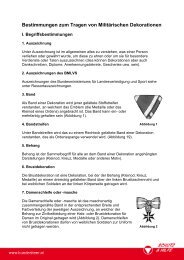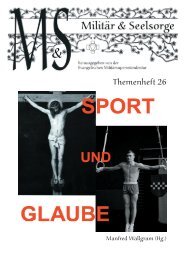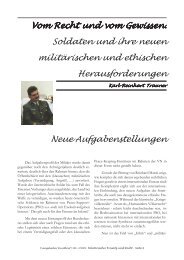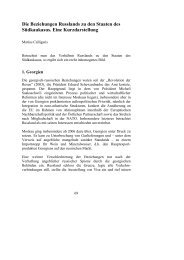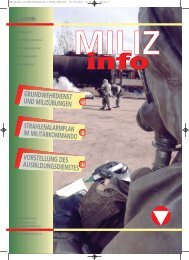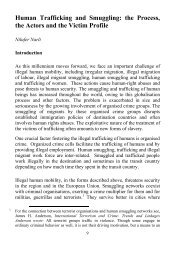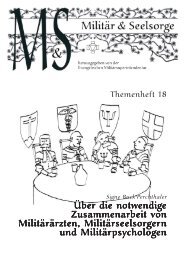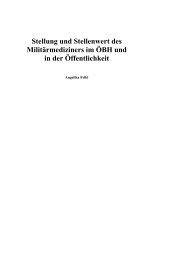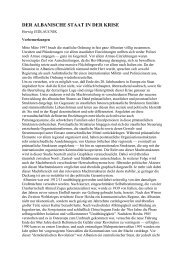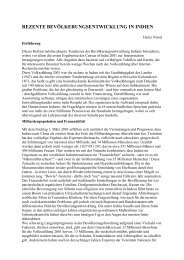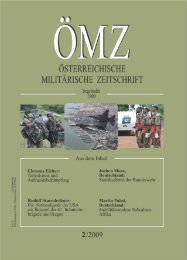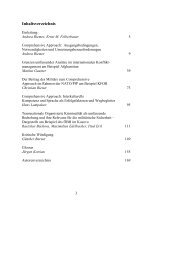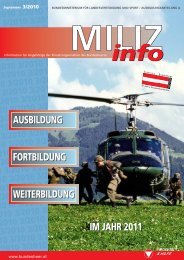Switzerland and Europe's Security Architecture: The Rocky Road ...
Switzerland and Europe's Security Architecture: The Rocky Road ...
Switzerland and Europe's Security Architecture: The Rocky Road ...
- No tags were found...
Create successful ePaper yourself
Turn your PDF publications into a flip-book with our unique Google optimized e-Paper software.
141web of international organizations, regimes, politically <strong>and</strong> legally binding internationalagreements, <strong>and</strong> common norms <strong>and</strong> principles serving as the backbone of Europe’s securityarchitecture. Because institutions "make certain things easier to do <strong>and</strong> other things harder todo" 7 they help to overcome international anarchy. <strong>The</strong>y can be regarded as the second safetydevice avoiding Mearsheimer’s scenario.4. Leadership: Despite its advantages a multilateral system tends to show signs ofinstitutional inertia, buck passing, <strong>and</strong> inactivity − tendencies that undermine the credibility ofthe system. <strong>The</strong>refore a multilateral system cannot do without leadership, the third safetydevice, that helps to remedy such situations. However, in contrast to hegemonic stabilitytheory, where material resources play a crucial role, recent studies have emphasized theimportance of norms in persuading followers <strong>and</strong> the role of non-hegemonic states that c<strong>and</strong>evelop true leadership. 85. Supranational integration: A distinctly European experience remains to be mentioned:supranational integration. This phenomenon can be understood as a process wherebygovernments act jointly <strong>and</strong> freely to create international bodies by transferring sovereignty,thus granting them executive power. Within such a framework governments not onlycoordinate their policies but also initiate common policies binding on member states. Such asupranational body can act independently <strong>and</strong> its norms are directly applicable therebyenjoying precedence over national law. Hence, supranational integration as the fourth safetydevice helps to prevent the renationalization of international politics. 9Let me now turn to the relationship between the five principles just mentioned <strong>and</strong> themilitary, the economic <strong>and</strong> the political-legal dimensions of Europe’s security architecture.Here, two aspects must be highlighted: First, <strong>and</strong> most important, Europe’s securityorganizations tend to work on the basis of identical core values. At the national level thedemocracy requirement (adhering to the rule of law, separating powers, free elections <strong>and</strong>guaranteeing human rights) has become the rule. At the international level openness,transparency, predictability, reciprocity, flexibility, abstention from the use of force,sufficiency <strong>and</strong> cooperation form the constitutional norms of a multilateral securityarchitecture for Europe in the 21st century. Second, there is a direct link between thecontribution of Europe’s security organizations <strong>and</strong> the dimensions analyzed. In the realm ofeconomics the transfer of sovereignty has led to the creation of a robust supranationalframework, especially in the EU. Together with transnational interest groups thesesupranational institutions have begun to develop a life of their own by adopting decisions thatheavily influence the member states’ policies. 10 In military matters, the aim of setting up7 Robert E. Goodin, "Institutions <strong>and</strong> <strong>The</strong>ir Design", in Robert E. Goodin (ed.), <strong>The</strong> <strong>The</strong>ory of InstitutionalDesign (Cambridge: Cambridge University Press, 1996), p. 16.8 Jarrod Wiener, "'Hegemonic' Leadership. Naked Emperor or the Worship of False Gods?", EUROPEANJOURNAL OF INTERNATIONAL RELATIONS, 1:2 (1997), pp. 219-243; Jarrod Wiener, "Leadership, the UnitedNations, <strong>and</strong> the New World Order", in Dimitri Bourantonis <strong>and</strong> Jarrod Wiener (eds.), <strong>The</strong> United Nations inthe New World Order: <strong>The</strong> World Organization at Fifty (New York: St. Martin's Press, 1995), pp. 41-63;Jarrod Wiener, Making Rules in the Uruguay Round of the GATT. A Study of International Leadership(Aldershot; Dartmouth, 1995).9 Most useful overviews of the vast literature on integration theory can be found in: Claus Giering, Europazwischen Zweckverb<strong>and</strong> und Superstaat (Bonn: Europa Union Verlag, 1997); Walter Mattli, <strong>The</strong> Logic ofRegional Integration (Cambridge: Cambridge University Press, 1999), pp. 19-40; Andrew Moravcsik, <strong>The</strong>Choice for Europe. Social Purpose <strong>and</strong> State Power from Messina to Maastricht (Ithaca: Cornell UniversityPress, 1998), pp. 18-85; Michael O'Neill, <strong>The</strong> Politics of European Integration. A Reader (London:Routledge, 1996), pp. 21-53, 122-144.10 Wayne S<strong>and</strong>holtz <strong>and</strong> Alec Stone Sweet (eds.), European Integration <strong>and</strong> Supranational Governance(Oxford: Oxford University Press, 1998).
142multinational units, the required st<strong>and</strong>ardization of military doctrines <strong>and</strong> of equipment beginto encroach upon sovereignty. In order to keep multinational units working, governmentshave to agree on decisions limiting their sovereignty. In politics, most prominently in security<strong>and</strong> foreign affairs, intergovernmentalism still reigns over supranationalism. Nevertheless, themost recent developments in the Balkans have made it abundantly clear that the EU needs toreform its foreign <strong>and</strong> security policy system if it is to overcome its dependence on NATO<strong>and</strong> on US military assets. As will be shown below, these trends will heavily affect<strong>Switzerl<strong>and</strong></strong>’s foreign <strong>and</strong> security policy.Proposition 1: <strong>The</strong> most recent developments at the European level will narrow<strong>Switzerl<strong>and</strong></strong>'s options in foreign <strong>and</strong> security policy.Although the changes mentioned favor <strong>Switzerl<strong>and</strong></strong>’s security <strong>and</strong> foreign policy interests,the outcome is ambivalent: While the country should <strong>and</strong> can benefit from these developmentsthey will at the same time narrow the country’s foreign <strong>and</strong> security policy options. Ittherefore becomes necessary to clarify the meaning of neutrality in post-Cold War Europe(see proposition 2).No doubt the recent conflicts in the Balkans have heavily affected Europe’s securityarchitecture <strong>and</strong> Europe’s preparedness to come to terms with its deficiencies. First, theBalkan conflicts have demonstrated what NATO will be about in post-Cold War Europe.Second, these conflicts have also shown that with the partial exception of the UK <strong>and</strong> France,European armed forces lack the necessary capabilities for crisis management. 11 This can beinterpreted as the primary reason for the Franco-German decision to reactivate the Eurocorps<strong>and</strong> its new role as a Rapid Reaction Force. 12 In addition, the fast-track plan to integrate theWEU into the EU to strengthen the latter’s military crisis management capability alsooriginates in recent events. 13Third, security experts propose to learn from the Euro experience. Creating the commoncurrency <strong>and</strong> the European Monetary Union would have been much more difficult withoutconvergence criteria required from all countries willing to participate. <strong>The</strong> same logic couldbe applied to European military cooperation <strong>and</strong> the following criteria could be used asbenchmarks: Spending on procurement <strong>and</strong> R & D, the level of military manpower as apercentage of the population, defense spending per person, <strong>and</strong> the percentage of a country’sarmed forces ready for deployment outside the NATO area. 14 <strong>The</strong>se criteria could bemonitored by a peer group. As in the business world where benchmarking has become ast<strong>and</strong>ard instrument for improving production processes <strong>and</strong> services, the application ofdefense convergence criteria could lead to similar processes in military recruitment <strong>and</strong>procurement, strategic planning <strong>and</strong> defense industry cooperation. First signs of positive side11 For an up-to-date assessment see: Gordon Wilson (ed.), European force structures. Papers presented at aseminar held in Paris on 27 & 28 May 1999 (Paris: WEU Institute for <strong>Security</strong> Studies, 1999; OccasionalPapers, no. 8).12 NEUE ZÜRCHER ZEITUNG, 31 May 1999, p. 3.13 Presidency Conclusions, Cologne European Council, SN 150/99, 3/4 June 1999, Annex III: EuropeanDeclaration on Strengthening Common European Policy on <strong>Security</strong> <strong>and</strong> Defence, pp. 33-42; PresidencyConclusions, Helsinki European Summit, SN 300/99, 10/11 December 1999, Paras. 25-28 <strong>and</strong> Annex IV:Presidency reports on strengthening the common European policy on security <strong>and</strong> defence <strong>and</strong> on nonmilitarycrisis management of the European Union.14 Charles Grant, European defence post-Kosovo? (London: Centre for European Reform, 1999). <strong>The</strong> idea ofdefense convergence criteria was first proposed by François Heisbourg in the June/July edition of the Centrefor European Reform Bulletin (http://www.cer.org.uk/news/n_6_1.htm). A similar idea was also put forwardby French President Jacques Chirac in his speech before the North Atlantic Assembly on 20 October 1999.See: NEUE ZÜRCHER ZEITUNG, 21 October 1999, p. 5.
143effects are already visible in the growing consolidation of the European aerospace industry. 15At the beginning of 1999, British Aerospace acquired Marconi Electronic Systems, theGeneral Electric Company’s manufacturer of defense components. In Autumn 1999, theFrench Aerospatiale Matra SA <strong>and</strong> the German-American Daimler Chrysler Aerospace AG(DASA) decided to form the new European Aeronautic, Defense <strong>and</strong> Space Company(EADS), which was later joined by the Spanish aircraft manufacturer CASA. 16 <strong>The</strong>sedevelopments also benefit from the growing involvement of the European Commission in theharmonizing of Europe’s defense industries. 17Finally, the ties between EU <strong>and</strong> NATO are getting closer, with NATO granting the EUaccess to its military capabilities. 18 It has been proposed in EU discussions that the position ofthe EU-neutrals will not formally be changed by the WEU’s integration into the EU.However, it is quite clear that it will become more <strong>and</strong> more difficult to stay apart in corequestions of European defense <strong>and</strong> security policy. EU <strong>and</strong> NATO membership are still twodifferent things but there will be growing political pressure from the EU to reduce differencesin membership. This is due to the fact that the application of article V of the WEU treatyremains restricted to NATO members of the EU. <strong>The</strong> faster the Union is exp<strong>and</strong>ing eastwards<strong>and</strong> the longer it takes to build up the necessary military capabilities the greater will be thedanger of so-called "back door" security guarantees for the new members, somethingWashington is unwilling to give.<strong>The</strong> consequences are obvious. On the one h<strong>and</strong>, these changes will strengthen NATO bymaking it more flexible for European operations without the participation of US armed forces<strong>and</strong> by bolstering the European capability within the Alliance. On the other h<strong>and</strong>, they willraise the EU’s profile in military matters. <strong>Switzerl<strong>and</strong></strong> now faces two problems. First, it is nota member of these organizations. Although it may benefit from PfP, the fact that thegovernment cannot fully participate in the decision making process of a policy area growingin importance is bad. Second, as will be shown in more detail below, the government’sleeway regarding participation in international military operations <strong>and</strong> training exercises islimited. 19 On the one h<strong>and</strong>, this is due to the fact that the Swiss in 1994 rejected a lawestablishing Swiss peacekeeping forces. On the other h<strong>and</strong>, this is due to the government’sunderst<strong>and</strong>ing of neutrality. From the outset of its involvement in PfP the government hascategorically excluded Swiss participation in defense-like military exercises. When signingthe PfP Framework Document in 1996, then Foreign Minister Flavio Cotti even declared that<strong>Switzerl<strong>and</strong></strong> could (<strong>and</strong> probably also would) withdraw from PfP if the initiative took a15 It is not surprising that a transnational merger mania is growing in the aerospace industry because thenational consolidation process is much more advanced in this sector than in maritime or in armored vehiclesindustries.16 NEUE ZÜRCHER ZEITUNG, 20 January 1999, p. 19; 15 October 1999, p. 21; 3 December 1999, p. 27.17 Implementing European Union Strategy on Defence-Related Industries, COM (97) 538 final, 12 November1997; Presidency Conclusions, Cologne European Council, SN 150/99, 3/4 June 1999, Annex III: EuropeanDeclaration on Strengthening Common European Policy on <strong>Security</strong> <strong>and</strong> Defence, Para. 2. For an overviewof what has been achieved so far see: Rudolf Agstner, "Europäische Rüstungspolitik. Drei Jahre Ad hoc-Gruppe des EU-Rates 'Europäische Rüstungspolitik' (POLRAM)", ÖSTERREICHISCHE MILITÄRISCHEZEITSCHRIFT, 36:5 (1998), pp. 505-516; John Lovering, "Which Way to Turn? <strong>The</strong> European DefenseIndustry After the Cold War", in Ann R. Markusen <strong>and</strong> Sean S. Costigan (eds.), Arming the Future. ADefense Industry for the 21st Century (New York: Council on Foreing Relations Press, 1999), pp. 334-370.18 Washington Summit Communiqué, signed <strong>and</strong> issued by the Heads of State <strong>and</strong> Government participating inthe meeting of the North Atlantic Council in Washington, D.C., 24 April 1999 (NAC-S(99)63), Paras. 9-10.19 A revised edition of the Militärgesetz, which foresees international cooperation for training purposes will bediscussed by the parliament in the year 2000. It is to be expected that political right-wing groups will launcha referendum that will be due in 2001.
145<strong>Security</strong> <strong>and</strong> Cooperation in Europe (OSCE) <strong>and</strong> the EU’s Common Foreign <strong>and</strong> <strong>Security</strong>Policy (CFSP). Multilateralism is given much more weight while neutrality should be usedonly when all other instruments fail <strong>and</strong> the international order has collapsed. 26 <strong>The</strong> followingforeign policy options are declared compatible with <strong>Switzerl<strong>and</strong></strong>’s status as a neutral country:Joining the UN <strong>and</strong> the EU, participating in the development of the Union’s CFSP, joining theNorth Atlantic Cooperation Council (now called Euro-Atlantic Partnership Council, EAPC)<strong>and</strong> PfP, participating in economic sanctions of the UN <strong>and</strong> the EU, participating inpeacekeeping operations <strong>and</strong> granting the UN <strong>and</strong> NATO military transit rights. 27After the publication of the Report 93 it became obvious that <strong>Switzerl<strong>and</strong></strong>’s security policyneeded revision. Parallel to the new foreign policy report the government submitted newlegislation calling for the creation of Swiss peacekeeping forces. In 1993, both chambers ofthe parliament agreed on the draft but three small right-wing parties (the Lega dei Ticinesi,the Freiheitspartei, <strong>and</strong> the Schweizer Demokraten) launched a referendum. At that time theUN peacekeeping activities unfortunately faced enormous problems in Somalia <strong>and</strong> inYugoslavia. <strong>The</strong>se problems backfired on those willing to change the course of <strong>Switzerl<strong>and</strong></strong>’ssecurity policy. In June 1994, the Swiss voted against a Swiss participation in UNpeacekeeping activities. 28<strong>The</strong> government needed time to recover. In the meantime NATO launched its PfP initiative<strong>and</strong> invited all OSCE states to enter into closer cooperation with the Alliance. Although theSwiss government welcomed this opportunity, the negative vote on the Swiss peacekeepingforce delayed its decision. Based on the Dayton Accord, NATO organized the ImplementationForce (IFOR) to enforce peace in Bosnia-Herzegovina. IFOR turned out to be a success. As aresult the government in late 1995 decided to allow NATO transports on the ground <strong>and</strong> in theair through <strong>Switzerl<strong>and</strong></strong> to Bosnia-Herzegovina. Given the negative vote on blue helmets, thegovernment was not in a position to support IFOR militarily. During the Swiss OSCEPresidency in 1996 the government therefore decided to launch the unarmed SwissHeadquarters Support Unit to assist the OSCE in Bosnia-Herzegovina. <strong>The</strong>se steps werepositively received by <strong>Switzerl<strong>and</strong></strong>'s political parties <strong>and</strong> the population. Almost three yearsafter the invitation, then Foreign Minster Flavio Cotti signed the PfP Framework Document inBrussels in December 1996. 29 Subsequently, the government felt strong enough to launch anew round of discussions on <strong>Switzerl<strong>and</strong></strong>'s new security policy.<strong>The</strong> new <strong>Security</strong> Policy Report (Report 2000) is the preliminary result of this discussion. 30<strong>The</strong> new report’s title – "<strong>Security</strong> through Cooperation" – makes it clear that the old doctrineno longer applies. <strong>The</strong> new report has various origins. On the one h<strong>and</strong>, it grew out of thereport of a commission of experts that in 1998 published the so-called Bericht Brunner. 31 Thatreport strongly argued in favor of increasing cooperation in the field of security policy. On theother h<strong>and</strong>, the Bericht Brunner paved the ground for the security policy guidelines thegovernment published some months later. Most important was the following statement:26 Report 93, pp. 20-46.27 For a critical assessment see: Jürg Martin Gabriel, "Neutralität für den Notfall: Der Bericht des Bundesratszur Aussenpolitik der Schweiz in den 90er Jahren", in Gabriel, Sackgasse Neutralität, pp. 129-158.28 For a more detailed account see: Robert Diethelm, Die Schweiz und friedenserhaltende Operationen, 1920-1995 (Bern: Paul Haupt Verlag, 1997), pp. 266-283.29 For a more detailed account of <strong>Switzerl<strong>and</strong></strong>'s road to PfP see: Wenger/Breitenmoser/Lehmann, "DiePartnerschaft für den Frieden – eine Chance für die Schweiz", pp. 66-88.30 Sicherheit durch Kooperation. Bericht des Bundesrates an die Bundesversammlung über dieSicherheitspolitik der Schweiz, Bern, 7 June 1999 (subsequently called Report 2000).31 Bericht der Studienkommission für strategische Fragen, Bern, 26 February 1998 (available online at:http://www.vbs.admin.ch/internet/d/armee/pub/brunn/index.htm)
147<strong>The</strong> feeling of security that neutrality conveyed over a very long period of time to the Swisspopulation has become deceptive. Neutrality alone is not sufficient to guarantee the security of<strong>Switzerl<strong>and</strong></strong> especially if it is equated with abstention from international security cooperation.Furthermore, it does not provide any guidance for our policy with regard to conflicts where thelaw of neutrality is not applicable. 35<strong>The</strong>se remarks come close to a revolution in Swiss security policy. However, the report isnot strict enough. If neutrality has in fact lost its value, why is every statement of securitycooperation accompanied by the remark that it either does not affect neutrality or iscompatible with it? And, to be more precise, if the report states that <strong>Switzerl<strong>and</strong></strong> shares withits neighbors the same opportunities <strong>and</strong> risks of the post-Cold War world, what is the use ofneutrality? When <strong>and</strong> towards whom does the government want to practice neutrality?<strong>The</strong> Report 2000 is right in stating that neutrality must not become an obstacle to<strong>Switzerl<strong>and</strong></strong>’s security. Even if the country complies unreservedly with the law of neutrality,the report sees considerable room for maneuver. I think this is not correct. <strong>The</strong> problem theabove questions refer to is a familiar one, <strong>and</strong> it is illustrated by the recent statement of a wellknown member of the Swiss parliament:Today, NATO membership is a non-topic. Neutrality is deeply rooted in Swiss identity.Hence it would not be opportune to discuss the issue domestically. Furthermore, thecountry’s foreign policy situation does not require such a discussion, because there is noneed to question the principle of neutrality as such. 36<strong>The</strong> Report 2000 contains a similar argument: In order to ensure <strong>Switzerl<strong>and</strong></strong>’s security <strong>and</strong>regional stability it is not necessary to join NATO. And the government adds: "<strong>The</strong> fact that<strong>Switzerl<strong>and</strong></strong>, as a non-member of NATO, is excluded from activities under Article V of theWashington Treaty (collective defence) has no negative repercussions on our security,considering the nature of today’s threats <strong>and</strong> dangers". 37 <strong>The</strong> problem with this kind ofreasoning is threefold.First, referring to Swiss identity is a cheap excuse for not having to discuss the fact that theworld changes rapidly while the Swiss behave as if no change took place.Second, the foreign policy situation does in fact require a neutrality debate. It is true thatthere are no longer threats comparable to the ones faced in the Cold War. However, referringto NATO simply as a defense alliance misses the point. Everyone familiar with Lord Ismay’sfamous statement – that the purpose of NATO is to keep the Americans in, the Germansdown, <strong>and</strong> the Russians out – knows that the Alliance has always been a multipurposeorganization. Celeste Wall<strong>and</strong>er <strong>and</strong> Robert Keohane recently argued that NATO is a hybridinstitution, i.e. the Alliance can "deal both with security problems created by external threatsor problems <strong>and</strong> those problem posed by risks, mistrust, <strong>and</strong> misunderst<strong>and</strong>ings amongmembers." 38 <strong>The</strong> hybrid character greatly facilitated modifications in NATO’s aims <strong>and</strong>structures in the 1990s. 39 Furthermore, with the end of the Cold War, defense is just onefunction of the Alliance, which has grown in political importance. Integration of formerenemies, crisis management, peacekeeping <strong>and</strong> peace-enforcement are now the first priority.35 Report 2000, pp. 39-40 (own translation).36 Vreny Spoerry, "NATO-Beitritt der Schweiz?", ALLGEMEINE SCHWEIZERISCHE MILITÄRZEITSCHRIFT, 165:4(1999), p. 5 (own translation).37 Report 2000, p. 43.38 Celeste A. Wall<strong>and</strong>er <strong>and</strong> Robert O. Keohane, "Risk, Threat, <strong>and</strong> <strong>Security</strong> Institutions", in HelgaHaftendorn, Robert O. Keohane, <strong>and</strong> Celeste A. Wall<strong>and</strong>er (eds.), Imperfect Unions. <strong>Security</strong> Institutionsover Time <strong>and</strong> Space (Oxford: Oxford University Press, 1999), p. 34.39 Wall<strong>and</strong>er/Keohane, "Risk, Threat, <strong>and</strong> <strong>Security</strong> Institutions", pp. 40-46.
148<strong>The</strong> enhanced PfP <strong>and</strong> NATO’s Planning <strong>and</strong> Review Process (PARP) enable armed forces toachieve interoperability <strong>and</strong> to prepare for peace support operations. But it is exactly the lackof the discussion about neutrality that hinders <strong>Switzerl<strong>and</strong></strong> to participate fully in theseactivities.Third, as I argued in the first section, <strong>Switzerl<strong>and</strong></strong>’s foreign <strong>and</strong> security policy options arenarrowing because NATO remains the cornerstone of Europe’s security architecture <strong>and</strong> alsobecause there is a rapprochement between the EU <strong>and</strong> the Alliance. <strong>The</strong> neutral EU memberswill inevitably come under pressure. Consider this: In autumn 1998 Austria for the first timeheld the EU Presidency. <strong>The</strong> situation in Kosovo worsened. Close contacts between the EUPresidency <strong>and</strong> NATO officials were necessary to coordinate their actions. NATO officialsprobably have confronted the Austrians with the fact that they are planning a militaryintervention without the consent of the UN <strong>Security</strong> Council. Is it realistic to assume thatneutral Austria, without loosing political credibility, could at that point have opted out <strong>and</strong> leftthe "hot potato" for someone else to deal with? <strong>Switzerl<strong>and</strong></strong> was facing a similar problem.During Operation Allied Force, executed without UN m<strong>and</strong>ate, <strong>Switzerl<strong>and</strong></strong> like Austriadenied transit rights for allied airplanes. <strong>The</strong> government referred to the law of neutrality tojustify its position. It changed only after UN <strong>Security</strong> Council resolution 1244 was adopted. Insuch a case neutrality becomes dysfunctional <strong>and</strong> incredible because the neutrality argumentwas at odds with the fact that <strong>Switzerl<strong>and</strong></strong> <strong>and</strong> Austria both supported Operation AlliedForce. 40 Since the so-called "Petersberg tasks" are growing in importance such dilemmas willbecome the rule, not the exception. <strong>The</strong> non-neutral EU/NATO countries will therefore haveto find ways permitting the participation of neutrals. <strong>The</strong>y must themselves decide whether<strong>and</strong> how restrictive to apply neutrality. Better for both to make up their minds now than on theeve of a new crisis.Proposition 3: <strong>The</strong> management structures of the Swiss Defense Department are not up tothe new security policy report – they need to be totally overhauled, <strong>and</strong> the primacy ofpolitics must be reaffirmed.Steven Cambone of the Washington based Center for Strategic <strong>and</strong> International Studies(CSIS) has recently presented his analysis of the US national security policy planningstructures. He argued that the structures are outdated <strong>and</strong> overly focused on military aspectsof security. 41 <strong>The</strong> same can be said about the structure of the Swiss Defense Department.Apart from the discussion about a Swiss National <strong>Security</strong> Council, 42 there are two basicstructural problems so far underestimated by the reformers.First, in <strong>Switzerl<strong>and</strong></strong> civil-military relations have for centuries been military-civilianrelations. 43 This fact is most prominently reflected in the management structures of theDepartment. <strong>The</strong> top decision making units (Geschäftsleitung <strong>and</strong> Geschäftsleitungsaus-40 For an Austrian view see: Gustav Gustenau, "Das Neutralitätsdilemma. Die österreichische Sicht", ALLGE-MEINE SCHWEIZERISCHE MILITÄRZEITSCHRIFT, 165:6 (1999), p. 11; Erich Reiter, Neutralität oder NATO. Diesicherheitspolitischen Konsequenzen aus der europäischen Aufgabe Österreichs (Graz: Verlag Styria, 1996).41 Steven A. Cambone, A New Structure for National <strong>Security</strong> Policy Planning (Westport: Praeger, 1998).42 Kurt R. Spillmann, "Sicherheitspolitik ist Chefsache der Exekutive. Überlegungen zur strategischenNeuausrichtung", NEUE ZÜRCHER ZEITUNG, 15 March 1999, p. 11; Report 2000, pp. 67-69.43 Recently, Michael C. Desch argued that it is easiest for civilians to control the military when they faceprimarily international (external) threats. However, after the end of the Cold War domestic risks <strong>and</strong> threatsare more likely. According to Desch this makes it more difficult to control the military. Michael C. Desch,Civilian Control of the Military. <strong>The</strong> Changing <strong>Security</strong> Environment (Baltimore, London: <strong>The</strong> JohnsHopkins University Press, 1999).
149schuss) are dominated by high-ranking military. 44 By contrast, New Zeal<strong>and</strong>’s Ministry ofDefense is headed by the Secretary of Defense <strong>and</strong> an Executive Board that consists entirelyof civil managers. <strong>The</strong> Comm<strong>and</strong>ers of the Army, the Navy <strong>and</strong> the Air Force are subordinateto the Executive Board. 45 It comes as no surprise that the Swiss Defense Department canhardly adopt a decision that the military oppose. This poses particular problems for<strong>Switzerl<strong>and</strong></strong>’s participation in PfP, which some military would still like to block. It alsohinders the reform of the recruiting system <strong>and</strong> the training of soldiers.Second, insiders have for long advocated the establishment of corporate structures at thetop of the Department by dissolving the Secretariat General <strong>and</strong> reorganizing theadministrative structures. This proposal takes into account the most recent security changes inEurope, which no longer require the primacy of territorial defense. It is also a consequence ofthe declared aim of implementing the principles of new public management <strong>and</strong> of the new<strong>Security</strong> Policy Report’s plea for flexible security cooperation at home. Finally, establishingcorporate structures is necessary to safeguard the Department’s manageability. Ever since twonew branches – sports <strong>and</strong> civil protection – were transferred to the Defense Department, thelatter looks like an industrial conglomerate. Because its branches have only few things incommon they need to be run independently. However, without common strategic guidelinesthe Department’s leadership will soon face chaos. That is why a small unit at the top of theDepartment should be responsible for corporate planning <strong>and</strong> corporate development <strong>and</strong> foradopting the Department’s guidelines for finance, personnel, public relations, informationtechnology <strong>and</strong> armament procurement.Following the primacy of politics the establishment of corporate structures will lead to animportant reallocation of resources from the General Staff to the new civilian corporatestructures. Small wonder the opposition against this plan has intensified recently. But theresistance of some General Staff members is problematic for two reasons. First, this is oncemore proof that at the top of the Department civil-military relations do not work. Second, theprocess of establishing "Army XXI" is dominating the reform of the whole Department. Thisputs management principles on their head <strong>and</strong> endangers the effective reform of theadministrative structures <strong>and</strong> the successful integration of the two new branches. While thereform process of the armed forces can <strong>and</strong> should not be stopped, the Head of theDepartment has to make clear that he is willing to introduce the new corporate structuresthereby reaffirming the primacy of politics in military affairs.Proposition 4: <strong>The</strong> new security policy report missed the opportunity to clarify the army'sdomestic role.So-called "subsidiary operations" of the armed forces are politically sensitive. <strong>The</strong>re isgood reason to rely on the armed forces in case of emergencies caused by natural catastrophessuch as floods or avalanches. However, the protection of foreign embassies in <strong>Switzerl<strong>and</strong></strong> orthe surveillance <strong>and</strong> support of refugee camps is not a task that should be given to the armedforces. While it is true that such operations will have to be approved by the relevant civilian44 According to Article 3 of the Militärorganisationsverordnung (SR 510.21), the Geschäftsleitung consists ofthe Head of the Department, the Secretary General (both civilians), the Chief of the General Staff, the Chiefof the Army, the Comm<strong>and</strong>ers of the Army Corps, the Chief of the Air Force (all military), <strong>and</strong> the Chief ofthe Armament Unit (civilian). With the exception of the four Comm<strong>and</strong>ers, the same people also meet in theGeschäftsleitungssausschuss. <strong>The</strong> new Geschäftsordnung of the Defense Department, which entered intoforce at the end of 1999, has only marginally improved the situation.45 For more on this see http://www.defence.govt.nz/org/mod.htm.
150authorities, 46 there is a tendency to rely on the armed forces too quickly. Even moreimportant, the cost of such operations conducted by the armed forces tends to beunderestimated. According to General Staff calculations army operations to support <strong>and</strong>survey refugee camps could cost up to 100 million Swiss Francs (US$ 70 million) a year. 47 Toprotect foreign embassies <strong>and</strong> international organizations one should either consideroutsourcing, or establishing more robust police forces in the cantons, thereby following theFrench or Italian pattern. Concerning the army’s future role in h<strong>and</strong>ling refugee camps theproject teams "Army XXI" <strong>and</strong> "Civil Protection" have agreed on the following: Normally,the camps will get the support of local civil authorities. If they cannot h<strong>and</strong>le the dem<strong>and</strong>s, thecivil protection agencies step in. <strong>The</strong> army will no longer be involved in these kinds ofsubsidiary operations. 48 This is a good solution which will hopefully have an impact on thenew conceptions for the army <strong>and</strong> the area of civil protection.Proposition 5: It is a bitter irony that <strong>Switzerl<strong>and</strong></strong> discovers the relevance of the EU forits own security at a time when it is harder than ever to benefit from it.<strong>The</strong> experts drafting the Report 2000 were heavily influenced by two most recentincidents: First, by the international debate on <strong>Switzerl<strong>and</strong></strong>’s role during World War II(Holocaust debate). Second, by the growing number of refugees <strong>Switzerl<strong>and</strong></strong> received in theaftermath of the Balkan conflicts. Both events have changed the way in which the Swissgovernment looks at the EU. So far the EU was an economic area. <strong>Switzerl<strong>and</strong></strong> was eager toparticipate economically but it had great reservations with regard to the Union’s politicalsystem. Nowadays, the Union is portrayed as an area of common security from which<strong>Switzerl<strong>and</strong></strong> stays apart.According to the new security policy report the Holocaust debate was merely a prelude tothe kind of political <strong>and</strong> economic pressure the country will have to cope with in the future. 49Consequently, the Report 2000 argues that <strong>Switzerl<strong>and</strong></strong> would benefit from joining the EU.This argument is short-sighted. Since the end of World War II the official policy emphasized<strong>Switzerl<strong>and</strong></strong>’s status as a neutral <strong>and</strong> non-aligned country <strong>and</strong> the expectation was thatbecause <strong>Switzerl<strong>and</strong></strong> was neither a member of the UN, NATO or the EU the probability that itwill be the target of political or economic pressure was extremely unlikely. Today, thisargument is put on its head. Because <strong>Switzerl<strong>and</strong></strong> is neutral <strong>and</strong> stays out of most internationalorganizations, it is vulnerable. Joining the EU would therefore make the country moreresistant against such attacks. 50 But is it realistic to believe that the European Commission orany EU member would have threatened to adopt sanctions against the United States becauseof the verbal attacks of one US Senator eager to get reelected <strong>and</strong> because of the publicrelations offensive of some exponents of the World Jewish Congress? And what about thecredibility of a country that seeks the EU’s protection in case of economic pressure <strong>and</strong> – inthe same paragraph of its security policy report – refers to the principle of constructiveabstention in case of EU decisions the government is not willing to support?<strong>The</strong> second problem, that of the growing numbers of refugees is more important. At theheights of the refugee flows from Kosovo to <strong>Switzerl<strong>and</strong></strong> the country received about 60,00046 Verordnung über den Truppeneinsatz für den Ordnungsdienst (SR 513.71), Verordnung über denTruppeneinsatz für den Grenzpolizeidienst (SR 513.72), Verordnung über den Truppeneinsatz zum Schutzvon Personen und Sachen (SR 513.73).47 NEUE ZÜRCHER ZEITUNG, 29 May 1999, p. 16.48 Personal interview with Karl Widmer, head of the project team "Civil Protection", Bern, 20 October 1999.49 Report 2000, p. 16, 44.50 A cynic would argue that this argument makes NATO membership inevitable because the USA wouldhardly bash a fellow alliance member.
151asylum seekers. Due to the increased number of refugees the government had to requestadditional funds of around 315 million Swiss Francs (US$ 210 million). Together with thefigures from the regular budget <strong>and</strong> all other expenses caused by the crisis in the Balkans,total spending amounted to approximately 1.2 billion Swiss Francs (US$ 800 million) in1999. 51 Furthermore, the opening <strong>and</strong> the support of reception camps required the help of thearmy because the civilian infrastructure was inadequate. This caused a new debate about thearmy’s domestic role (see proposition 4). In addition, the growing number of refugeesnurtured the right-wing critics of the government’s asylum <strong>and</strong> migration policy <strong>and</strong> lead toan ugly pre-election campaign of the Schweizerische Volkspartei. In such cases thegovernment would indeed benefit from EU membership. Not only would it be easier to talkabout burden sharing but new risks such as organized crime, money laundering <strong>and</strong> thetrafficking of narcotics require international coordination <strong>and</strong> cooperation. With the newAmsterdam treaty <strong>and</strong> the decisions of the European Council taken in Tampere, Finl<strong>and</strong>, theEU member states have set the stage for a Union of Freedom, <strong>Security</strong> <strong>and</strong> Justice. 52 This willincrease cooperation in home <strong>and</strong> justice affairs, <strong>and</strong> it is a real disadvantage that <strong>Switzerl<strong>and</strong></strong>cannot participate. <strong>The</strong> following paragraph illustrates the government’s frustration:Despite intensive efforts, <strong>Switzerl<strong>and</strong></strong>’s efforts to at least partially participate in themultilateral European security schemes have not yet met with full success. <strong>Switzerl<strong>and</strong></strong>suggested negotiations on a parallel agreement to the Dublin Convention, tried tocooperate with Europol <strong>and</strong> made even soundings regarding the possibility of aninstitutionalized cooperation with the Schengen group, especially in the areas of visapolicy, border controls, consular cooperation <strong>and</strong> the Schengen Information System. 53At the turn of the century the Swiss government recognizes that the EU is more than just afree market. <strong>The</strong> Union has its own currency <strong>and</strong> it is becoming more active in security, home<strong>and</strong> justice affairs. Furthermore, the European Commission is gearing up its admissionnegotiations <strong>and</strong> has proposed talks with six more c<strong>and</strong>idate countries <strong>and</strong> Turkey. 54 Not onlyis the EU deepening, it is also widening. <strong>Switzerl<strong>and</strong></strong> is not part of it, <strong>and</strong> participation fromthe outside will be harder than at any time before.3. <strong>The</strong> Kosovo Crisis: Mixed Results of the First TestBesides having to cope with a growing number of refugees at home, <strong>Switzerl<strong>and</strong></strong>’sgovernment has launched numerous programs to support the international community inKosovo. <strong>Switzerl<strong>and</strong></strong>’s bilateral <strong>and</strong> multilateral support falls into three broad categories:military, civilian, <strong>and</strong> economic. 55Military support: Despite Swiss legal restrictions, the Defense Department has beenmaking military contributions to international humanitarian activities since NATO launchedits air campaign in March 1999. At the request of the Euro-Atlantic Disaster Response51 Press Release by the Finance Department, Bern, 27 September 1999.52 Presidency Conclusions, Tampere European Council, 15/16 October, SN 200/99.53 Report 2000, p. 46.54 "Commission sets out an ambitious accession strategy <strong>and</strong> proposes to open accession negotiations with sixmore c<strong>and</strong>idate countries", Brussels, 13 October 1999, IP/99/751; Presidency Conclusions, HelsinkiEuropean Council, 10/11 December 1999, SN 300/99, Paras. 10, 12.55 Heiko Borchert, "<strong>The</strong> Kosovo Conflict <strong>and</strong> the Swiss Contribution", EUROPEAN SECURITY, 8:4(forthcoming). For more up-to-date information see the weekly ‘Balkan Newsletter’ issued by the FederalDepartment of Foreign Affairs, Justice <strong>and</strong> Police, <strong>and</strong> Defense, Civil Protection <strong>and</strong> Sports(http://www.eda.admin.ch/ site/g/publikationen/balkanbulletin.htm).
152Coordination Center (EADRCC), which Bern eagerly helped to set up, the Swiss governmentdecided on 6 April 1999 to launch "Operation ALBA", which was completed on 24 July1999. 56 <strong>The</strong> operation consisted of three Swiss Air Force Super-Puma helicoptersaccompanied, for security reasons, by members of the fortification guard. <strong>The</strong> operationprovided logistical support for the United Nations High Commissioner for Refugees(UNHCR) by transporting commodities (more than 850 tons) <strong>and</strong> persons (approximately5,000 including about 350 medical evacuations). To guarantee logistical support the DefenseDepartment rented a CASA 235 transport aircraft from the Spanish Air Force, which costsabout 4,900 Swiss Francs (US$ 3,000) an operating hour. 57After the UN <strong>Security</strong> Council adopted resolution 1244 establishing the United NationsMission in Kosovo (UNMIK), the government decided on 23 June 1999 to broaden itsmilitary contribution by setting up a military unit consisting of 160 unarmed volunteers.Deployment of SWISSCOY, which will cost about 55 million Swiss francs (US$ 36 million)per year, began in late September. <strong>The</strong> troops will stay in Kosovo until the end of the year2000. <strong>The</strong> military unit will closely cooperate with an Austrian battalion stationed in theGerman KFOR sector. For legal reasons the government emphasized that SWISSCOY willneither be subordinate to the Austrian battalion nor to NATO. <strong>The</strong> Austrians will guaranteethe security of the Swiss soldiers who in turn will assist the former in reconstructing thecivilian infrastructure (e.g., electricity, water distribution) <strong>and</strong> will provide logistical <strong>and</strong>medical support. 58Civilian support: In order to help the victims of the conflict in Kosovo <strong>and</strong> Serbia,<strong>Switzerl<strong>and</strong></strong>, together with Russia, Greece, <strong>and</strong> Austria, launched operation FOCUS at the endof April 1999. It is an international humanitarian aid program that coordinates the transport ofcommodities – about 1,000 tons until October 1999 – to the region <strong>and</strong> guarantees theirdistribution to those in need of urgent help. In addition, the Swiss Disaster Relief Unit, whichis part of the Swiss Agency for Development <strong>and</strong> Cooperation (SDC), has deployed numerousexperts to the region. <strong>The</strong>y help to coordinate humanitarian aid in the field <strong>and</strong> providesupport in running the refugee camps primarily in Albania <strong>and</strong> Macedonia. By the end of1999, 25 Swiss were working in Kosovo on behalf of the UN <strong>and</strong> the OSCE, 30 expertsworked for the SDC. 59 Additionally, the government delegates experts for fact findingmissions by the International Criminal Tribunal for the Former Yugoslavia (ICTY). 60 In orderto help speed up the establishment of a civil society the government also supports theestablishment of a TV <strong>and</strong> radio broadcasting program organized by the UN <strong>and</strong> the OSCE.Radio Television Kosovo (R.T.K.) is headed by the President of the Swiss Radio <strong>and</strong>Broadcasting Company, Eric Lehmann.In May 1999, due to the growing number of refugees, the Swiss government alsoconsidered it necessary to discuss the need to prepare "emergency legislation" restricting therefugees’ access to the Swiss labor market <strong>and</strong> to health <strong>and</strong> education services. Whileapplauded by right-wing populists, this decision by incoming Minister of Justice, RuthMetzler, caused storms of protests from left-wing politicians, women’s <strong>and</strong> non-governmentalrefugee organizations. In August 1999, the government adopted a one year work ban for allrefugees <strong>and</strong> those temporarily admitted. Furthermore, the government envisages revisingasylum legislation.56 <strong>The</strong> Super-Puma helicopters returned to the Balkans in autumn 1999 as part of SWISSCOY.57 NEUE ZÜRCHER ZEITUNG, 17 May 1999, p. 11.58 NEUE ZÜRCHER ZEITUNG, 24 June 1999, p. 13; 16 October 1999, p. 15.59 Balkan Bulletin, dated 8 October 1999.60 On 11 August, 1999 Swiss state attorney Carla Del Ponte was appointed Prosecutor of the ICTY.
153Economic support: <strong>The</strong> Swiss government has granted several loans to supporthumanitarian aid programs by the Swiss Disaster Relief Unit, the UNHCR <strong>and</strong> theInternational Committee of the Red Cross (ICRC). <strong>The</strong> government also launched threeprograms worth 15 million Swiss Francs (US$ 10 million), called "Cash for Shelter", "Cashfor Education" <strong>and</strong> "Cash for Health", to support the FYR of Macedonia. Another 10 millionSwiss Francs (US$ 7 million) are designed to support Macedonia’s balance of payments <strong>and</strong>should compensate for some of the trade <strong>and</strong> investment loss caused by the Kosovo conflict.In September the "Cash for Shelter" program was also launched in Kosovo, <strong>and</strong> thegovernment started its "Cows for Kosovo" program, which aims at supporting localagriculture with over 500 cattle, cows <strong>and</strong> bulls. Finally, in June 1999, the Swiss governmentdecided to speed up the repatriation of Kosovo refugees. It launched a 250 million Swissfrancs (US$ 165 m) return program, which consists of 2,000 Swiss francs (US$ 1,300) in cashfor every refugee who decides to return voluntarily. It also includes material aid distributed inKosovo to support <strong>and</strong> facilitate the reconstruction of their homes. 61 About 12,000 refugeesdecided to take advantage of the offer, which was valid until November 1999, <strong>and</strong> about3,000 submitted return applications. 62 After this time financial <strong>and</strong> material aid will bereduced.Proposition 6: Incoherent implementation by the various ministries is the greatest dangerfacing both the new <strong>Security</strong> Policy Report <strong>and</strong> the Foreign Policy Report issued in 1993.<strong>Switzerl<strong>and</strong></strong>’s policy during the Kosovo conflict produced mixed results. On 21 May 1999,Alex<strong>and</strong>er Tschäppät, the head of a parliamentary watchdog committee, correctly criticizedthat "every Minister seems to act on its own" <strong>and</strong> that <strong>Switzerl<strong>and</strong></strong>’s policy lacks coherence.One minister, he said, is playing hard ball with the refugees while another minister salvagesKosovo refugees in her airplane. <strong>The</strong> critique aimed at Ruth Dreifuss, then President of theFederal Council. Tschäppät also criticized the absence of coordination between the SDCsponsored FOCUS program <strong>and</strong> the ICRC. Apart from a lack of adequate information he alsoblamed the institutionally weak position of the President as one of the main problems: "If theFederal Council has to cope with an ‘explosive’ issue one gets the impression that his work isbecoming uncoordinated", Tschäppät argued. 63<strong>The</strong> institutional weakness of the federal executive is familiar, but Tschäppät’s critiquecould be taken one step further. Lack of coherence can also be attributed to the inconsistentapplication of <strong>Switzerl<strong>and</strong></strong>’s foreign policy principles laid down in the Report 93. Taking theForeign Policy Report as a benchmark shows that Swiss policy during the Kosovo conflict ischaracterized by a combination of progressive <strong>and</strong> regressive elements. <strong>The</strong> DefenseDepartment has to be applauded for acting on the principles set forth by the Foreign PolicyReport. This is especially true for the decision to launch "Operation ALBA", to deploySWISSCOY <strong>and</strong> to arm individual Swiss soldiers stationed in a combat zone. In doing so, theDepartment operated at the limits of Swiss law.Its humanitarian assistance program notwithst<strong>and</strong>ing, the Foreign Affairs Departmentplayed a more ambivalent role. Despite public condemnation by then Foreign Minister FlavioCotti <strong>and</strong> contrary to the Report 93, <strong>Switzerl<strong>and</strong></strong> has not fully backed the sanctions imposedby the EU against the Federal Republic of Yugoslavia. On the one h<strong>and</strong>, the governmentsupported the freezing of bank accounts, the ban of export credits, the export ban on goods<strong>and</strong> technology, <strong>and</strong> also refused the entry of about 300 high-ranking Yugoslav politicians61 NEUE ZÜRCHER ZEITUNG, 24 June 1999, p. 13.62 Balkan Bulletin, dated 26 November 1999.63 NEUE ZÜRCHER ZEITUNG, 22 May 1999, p. 13.
154<strong>and</strong> their relatives. On the other h<strong>and</strong>, <strong>and</strong> due to a perceived incompatibility with the law ofneutrality, the government refused to join the EU ban on oil transactions, but announced thatsuch business would have to be notified. <strong>The</strong> government also decided not to support theEU’s sanctions against the Yugoslav airline JAT, justified with reference to Swiss asylumpolicy. It was argued that sanctions against JAT would endanger repatriation of criminals <strong>and</strong>refugees with the airline’s help at a later date. 64 <strong>The</strong>se explanations sound strange, they st<strong>and</strong>in stark contrast to the principles of solidarity <strong>and</strong> multilateralism as dem<strong>and</strong>ed in the Report93. <strong>The</strong>y also suggest that there are differences within the administration with regard to theapplication of these principles. 65<strong>The</strong> Justice Department’s report was similarly ambivalent. Its cooperation with theUNHCR was certainly in line with the report’s principle of actively supporting internationalorganizations. However, the Department’s strategy of making <strong>Switzerl<strong>and</strong></strong> more <strong>and</strong> moreunattractive for refugees <strong>and</strong> the discussion of "emergency legislation" created an unpleasantfeeling. No doubt, by welcoming about 60,000 refugees (total at the end of August 1999) <strong>and</strong>140,000 to 150,000 permanent <strong>and</strong> temporary Kosovo residents, <strong>Switzerl<strong>and</strong></strong> is shouldering aheavy burden. 66 However, one should not forget that countries like Albania or Macedonia,which received more than 400,000 <strong>and</strong> almost 250,000 refugees in the past months, arepaying a much higher tribute than <strong>Switzerl<strong>and</strong></strong>. 67 It seems that solidarity conflicts withdomestic politics <strong>and</strong> that politicians kept an eye on the autumn 1999 election.Proposition 7: Although <strong>Switzerl<strong>and</strong></strong> can participate in international (military) operationsits means are extremely limited. "<strong>Security</strong> through Cooperation", to be meaningful, mustinfluence army planning <strong>and</strong> the government's armaments procurement policy.<strong>The</strong> Defense Department’s analysis of the Kosovo conflict will have to affect the newstructure of the armed forces <strong>and</strong> the new armament procurement strategy. Shifting the focusfrom the primacy of territorial defense to increased international military cooperation willhave great consequences.First, the problem of arming troops abroad must finally be solved. While the Parliament’sCommission on <strong>Security</strong> Policy has recently agreed to arming forces abroad, 68 no finaldecision has yet been taken. Second, <strong>Switzerl<strong>and</strong></strong> will have to decide in advance about theforces to be deployed for international peace support operations. This will lead to changes inarmament procurement. It is a well known fact that peace support forces have different needsthan territorial defense forces. Among other things they require air transportation capabilities<strong>and</strong> armored vehicles. In addition they must be able to interact with NATO forces, i.e. theymust comply with the Alliance’s interoperability st<strong>and</strong>ards. 69 "Operation ALBA" has shownthat the professionals of the Swiss Air Force are rapidly deployable <strong>and</strong> that they can interactwith foreign armed forces. But "Operation ALBA" also exposed some weaknesses: Becausethe Swiss helicopters lacked NATO Transponder Codes they had to be accompanied byNATO helicopters in order to pass the "friend or foe" test by NATO’s air defense <strong>and</strong> radar64 NEUE ZÜRCHER ZEITUNG, 20 May, p. 13.65 Before the decisions to support EU's sanctions were taken there were differences within the Department ofForeign Affairs. While the Political Direction argued in favor of full participation the Direction forInternational Law had its doubts whether such a decision would be compatible with the law of neutrality.See: NEUE ZÜRCHER ZEITUNG, 17 May 1999, p. 13.66 Press release by the Department of Police <strong>and</strong> Justice, 8 April 1999.67 Figures by the UNCHR, dated 3 June 1999, quoted in the "Balkan Newsletter", dated 4 June 1999.68 NEUE ZÜRCHER ZEITUNG, 12 May 1999, p. 1369 For a broad assessment see: Kurt R. Spillmann, Andreas Wenger, <strong>and</strong> Marcel Mäder, "Interoperabilität –Eckwert für die Armee XXI. Voraussetzung für alle Optionen militärischer Kooperation", NEUE ZÜRCHERZEITUNG, 19 October 1999, p. 15.
155systems. Furthermore, in case of long term operations, the air force needs army support(caterpillars, containers, etc.). Finally, long distance operations are unthinkable withouttransportation aircraft either owned by the Swiss Air Force or rented. 70 Third, recruitingprinciples for peace support operations must be analyzed carefully. <strong>The</strong> militia system doesnot produce the amount of troops necessary for intermediate <strong>and</strong> long term internationalinvolvement. Hence, some sort of professionalization will be needed. In addition, one willalso have to think about the legal aspects. A recruiting system that requires doctors to becometemporary members of the federal service before taking part in the UNHCR support missionis simply too complicated <strong>and</strong> needs to be more flexible. 71Proposition 8: So far, civilian peace-building activities do not get the necessary attention:they suffer from a lack of financial, technical <strong>and</strong> personal resources, <strong>and</strong> they are badlycoordinated. With the establishment of a readily deployable Peace-Building Unit,<strong>Switzerl<strong>and</strong></strong> could make a major contribution.Complaints about the disproportionate role played by armed forces <strong>and</strong> civilian groups inthe process of peace-building are familiar. While the military provisions of the Dayton PeaceAccords were precise <strong>and</strong> enforceable, the annexes dealing with the Office of the HighRepresentative, the coordination of the international organizations active in peace-building<strong>and</strong> the establishment of local administration remained vague. <strong>The</strong> same can be said about theway the international community is dealing with the Kosovo conflict. Although UNMIKorganization looks good on paper, it is implemented very slowly. <strong>The</strong> main reasons are themember states’ reluctance to provide civilian peace-building activities with the necessaryfinancial, technical <strong>and</strong> personal resources. Management is not "in time", <strong>and</strong> there isinsufficient coordination between international organizations.To make a long story short: Peace-building desperately needs improvement. Here,<strong>Switzerl<strong>and</strong></strong> could do a good <strong>and</strong> useful job. In fact, the government’s 1998 report on SwissPfP activities says that <strong>Switzerl<strong>and</strong></strong> will actively promote cooperation between the military<strong>and</strong> civilian side in case of international crisis <strong>and</strong> catastrophes. 72 In 1996, the governmentmade a first step into the right direction by setting up the Swiss Headquarters Support Unit(SHQSU) in Bosnia-Herzegovina to support the local OSCE mission. SHQSU is responsiblefor logistical support (including postal services) <strong>and</strong> for maintaining the OSCE’s vehicles.This approach should be developed further by establishing a Swiss Peace-building Unitconsisting of a Headquarters Support Unit (HSU) <strong>and</strong> a Civilian Reconstruction Unit (CRU).<strong>The</strong> sub-units could be deployed either together or separately. <strong>The</strong> HSU should be seen as thenucleus for the administrative <strong>and</strong> technical support of an international peace-buildingmission. It would be staffed with experts (e.g., IT specialists, executive personnel, technicalspecialists) <strong>and</strong> would be given the necessary technological resources. Endowed with thefacilities needed to quickly set up a mission’s headquarters, the HSU would be anindispensable civilian rapid reaction tool. <strong>The</strong> CRU would build on the experience <strong>and</strong> theresources of the Swiss Disaster Relief Unit. It would be complemented by legal <strong>and</strong>administrative experts, business consultants, <strong>and</strong> election observers. Together with employees70 Walter Knutti, "Task Force 'ALBA'. Humanitärer Einsatz der Luftwaffe auf dem Balkan", ALLGEMEINESCHWEIZERISCHE MILITÄRZEITSCHRIFT, 165:9 (1999), p. 13-14; Arthur Friedrich Maiwald, "InternationaleRundschau: Schweiz", ÖSTERREICHISCHE MILITÄRISCHE ZEITSCHRIFT, 37:4 (1999), pp. 521-525.71 NEUE ZÜRCHER ZEITUNG, 17 May 1999, p. 11.72 Jahresbericht des Bundesrates über die Teilnahme der Schweiz an der Partnerschaft für den Frieden, Bern,April 1999.
156of international organizations these experts could set up a coordination center responsible forthe management of international aid programs in the field. 734. ConclusionsIn a heroic act the Swiss government has launched its new <strong>Security</strong> Policy Report labeled"<strong>Security</strong> through Cooperation". It implies stepping out of the country’s economic, political<strong>and</strong> military isolation. However, the decision comes late, perhaps too late, <strong>and</strong> it is somewhathalf hearted. <strong>The</strong> reason why the end of the Cold War in Europe offers no relief for<strong>Switzerl<strong>and</strong></strong>’s foreign <strong>and</strong> security policy lies in the persistence of neutrality. However, weshould not forget that neutrality can be modified. If this will not occur soon, the Swissgovernment risks being caught in a neutrality trap: Because of <strong>Switzerl<strong>and</strong></strong>’s favorablesecurity environment in post-Cold War Europe, one is unwilling to question neutralitypublicly. But it is precisely the lack of such a discussion which makes it impossible for<strong>Switzerl<strong>and</strong></strong> to benefit from the favorable security environment.Furthermore, it can be argued that the Swiss government has missed the opportunity totake the right decisions earlier. Because of the neutrality trap the country has enormousproblems participating in international military operations <strong>and</strong> training exercises.Additionally, its reluctance concerning the EU’s political system has increased the distancebetween Bern <strong>and</strong> Brussels at a time when the Union is ready to have its own market, its owncurrency, its own army <strong>and</strong> even a kind of common "domestic policy". This leads to a firstrate foreign <strong>and</strong> security policy dilemma: On the one h<strong>and</strong>, NATO membership is technicallypossible but not politically desirable; on the other h<strong>and</strong>, EU membership is politicallydesirable but not possible – at least not in the near future. 74What can be done? First of all, the government will have to back away from its neutralitypolicy. In today’s Europe neutrality no longer makes any sense. Following its strategic goal ofEU membership the government should, preferably within the next five years, publiclydeclare its willingness to become a member of NATO <strong>and</strong> of the UN. During that period thegovernment will have to launch a neutrality debate in parliament <strong>and</strong> a public relationscampaign to convince the population. Second, Defense Minister Adolf Ogi must take the leadin revising the Militärgesetz. <strong>The</strong> question of arming Swiss troops stationed abroad must besettled before Army XXI gets started in 2003. Third, Adolf Ogi <strong>and</strong> his colleague from theFinance Ministry, Kaspar Villiger, must find ways to guarantee the acquisition of hardwareneeded to safeguard the interoperability of Army XXI <strong>and</strong> to equip peace support operations.Fourth, despite difficulties, the government will have to talk with the European Commissionabout the possibility of conducting admission negotiations. <strong>The</strong> government needs a clear-cutstrategy, it requires a set of aims that are negotiable <strong>and</strong> that are fully backed by parliament,<strong>and</strong> it needs to get away from its policy of having full economic cooperation while enjoyingfull political independence. One cannot get one thing without compromising on another. Thatis the story behind the success of European integration <strong>and</strong> – to be honest – it was also thestory behind the success of the Swiss Federation in the 19th century.73 Heiko Borchert <strong>and</strong> Jürg Martin Gabriel, "Die Schweizer Armee und die europäische Sicherheitsordnung:Herausforderungen und Aufträge", in Thomas Cottier <strong>and</strong> Alwin R. Kopse (eds.), Der Beitritt der Schweizzur Europäischen Union (Zürich: Schulthess Polygraphischer Verlag, 1998), pp. 629.74 <strong>The</strong> results of a representative recent opinion poll (sample: about 2'200 persons) show that 69 % of the Swisspopulation are in favor of the country approaching the EU. 57 % would even back the country's EUmembership. While 47 % of the Swiss also favor closer contacts with NATO, only 25 to 30 % would back<strong>Switzerl<strong>and</strong></strong>'s NATO membership. See: NEUE ZÜRCHER ZEITUNG, 18 December 1999, p. 14.



